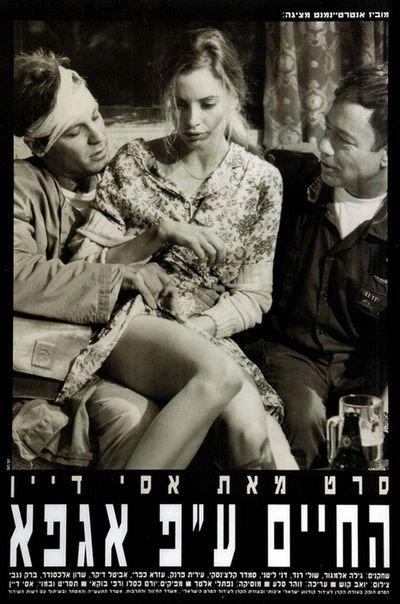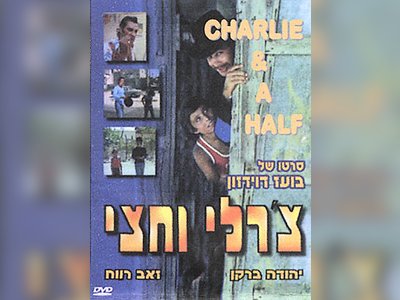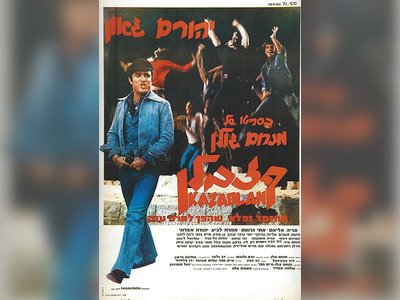מורשת גדולי האומה
בזכותם קיים
beta
Life According to Agfa": A Glimpse into Israel's Socio-Psychological Drama of the Early 1990s

"Life According to Agfa" is an Israeli socio-psychological drama film from 1992, written and directed by Assi Dayan and produced by Rafi Bukai and Yoram Kessler. This film, featuring an ensemble cast including Gila Almagor, Avital Dicker, Shuli Rand, Naftali Alter, Ezra Kafri, Sharon Alexander, and Irit Frank, aimed to capture the Israeli reality of the early 1990s, during the peak of the First Intifada. It does so through the lens of an eventful evening at a typical Tel Aviv pub called "Agfa," portraying various characters representing different aspects of Israeli society.
Synopsis:
The film "Life According to Agfa" unfolds in the Tel Aviv pub "Agfa," which is short for the mental health institution "Abarbanel." The story revolves around the lives of the pub's regulars, reflecting the social and political tensions in Israeli society, primarily the Israeli-Arab conflict. Each character is portrayed with both positive and negative aspects, showcasing their humanity. The film takes a bleak prophetic turn, offering a pessimistic view of the future of Israeli society, hinting at a potential civil war.
Key Themes and Events:
1. The Protagonists: The story introduces Delia (Gila Almagor), a middle-aged woman who frequents the pub, engaging in casual relationships with random men. Delia owns the pub "Agfa." Samir (Akram Tillawi) works in the pub and maintains it. The pub opens early in the evening every day.
2. Conflict Escalation: Nimi (Sharon Alexander), a wounded IDF officer, and his soldiers arrive at the pub after a mission, causing disturbances. Nimi's group is loud and aggressive, reflecting the militarized atmosphere of the time.
3. Police Intervention: Beni (Shuli Rand), a police officer, manages to diffuse the situation when Nimi and his group get confrontational with Samir and the other patrons. He orders Nimi and his soldiers into a taxi, sending them back to the base.
4. New Arrivals: Levi (Shmil Ben Ari), Moshe (Uri Klauzner), and Malka (Rivka Neuman), a violent and disrespectful group, enter the pub. They show contempt for the pub's regulars, especially Samir.
5. Violent Confrontation: A violent confrontation ensues between Levi and Samir, leading to a brawl that Beni ultimately breaks up. Eli (Ezra Kafri), Delia's partner and an Israeli Arab, arrives at the pub with his wife to separate her from Delia, who is left upset. Meanwhile, Liora (Irit Frank), a depressed young woman, returns home and discovers the lifeless body of Ricky, who has committed suicide.
6. Tragic Outcome: As Beni showers, Ricky jumps out of the window, taking her own life. Beni remains unaware of her death. Levi, Moshe, and Malka return to confront Beni, leading to a violent encounter where Beni is killed. Nimi and his soldiers, seeking revenge for their damaged car tires, launch an attack on the pub. In the background, Leonard Cohen's "Who by Fire" plays as chaos unfolds.
7. Dark Prophecy: After the massacre, the film concludes with Beni returning to Liora's apartment and presenting her with the pictures he took at "Life According to Agfa." The film ends with a panoramic view of Tel Aviv, suggesting a return to normalcy.
Reception:
"Life According to Agfa" received critical acclaim for its powerful portrayal of Israeli society and its prophetic message of uncertainty and impending doom. It is considered one of Assi Dayan's most significant and successful films, earning nine Ophir Awards and being nominated for the Golden Bear at the Berlin Film Festival. The film's dark and thought-provoking themes resonated with audiences and critics alike, making it a milestone in Israeli cinema history.
The film "Life According to Agfa" unfolds in the Tel Aviv pub "Agfa," which is short for the mental health institution "Abarbanel." The story revolves around the lives of the pub's regulars, reflecting the social and political tensions in Israeli society, primarily the Israeli-Arab conflict. Each character is portrayed with both positive and negative aspects, showcasing their humanity. The film takes a bleak prophetic turn, offering a pessimistic view of the future of Israeli society, hinting at a potential civil war.
Key Themes and Events:
1. The Protagonists: The story introduces Delia (Gila Almagor), a middle-aged woman who frequents the pub, engaging in casual relationships with random men. Delia owns the pub "Agfa." Samir (Akram Tillawi) works in the pub and maintains it. The pub opens early in the evening every day.
2. Conflict Escalation: Nimi (Sharon Alexander), a wounded IDF officer, and his soldiers arrive at the pub after a mission, causing disturbances. Nimi's group is loud and aggressive, reflecting the militarized atmosphere of the time.
3. Police Intervention: Beni (Shuli Rand), a police officer, manages to diffuse the situation when Nimi and his group get confrontational with Samir and the other patrons. He orders Nimi and his soldiers into a taxi, sending them back to the base.
4. New Arrivals: Levi (Shmil Ben Ari), Moshe (Uri Klauzner), and Malka (Rivka Neuman), a violent and disrespectful group, enter the pub. They show contempt for the pub's regulars, especially Samir.
5. Violent Confrontation: A violent confrontation ensues between Levi and Samir, leading to a brawl that Beni ultimately breaks up. Eli (Ezra Kafri), Delia's partner and an Israeli Arab, arrives at the pub with his wife to separate her from Delia, who is left upset. Meanwhile, Liora (Irit Frank), a depressed young woman, returns home and discovers the lifeless body of Ricky, who has committed suicide.
6. Tragic Outcome: As Beni showers, Ricky jumps out of the window, taking her own life. Beni remains unaware of her death. Levi, Moshe, and Malka return to confront Beni, leading to a violent encounter where Beni is killed. Nimi and his soldiers, seeking revenge for their damaged car tires, launch an attack on the pub. In the background, Leonard Cohen's "Who by Fire" plays as chaos unfolds.
7. Dark Prophecy: After the massacre, the film concludes with Beni returning to Liora's apartment and presenting her with the pictures he took at "Life According to Agfa." The film ends with a panoramic view of Tel Aviv, suggesting a return to normalcy.
Reception:
"Life According to Agfa" received critical acclaim for its powerful portrayal of Israeli society and its prophetic message of uncertainty and impending doom. It is considered one of Assi Dayan's most significant and successful films, earning nine Ophir Awards and being nominated for the Golden Bear at the Berlin Film Festival. The film's dark and thought-provoking themes resonated with audiences and critics alike, making it a milestone in Israeli cinema history.
- החיים על פי אגפאhe.wikipedia.org




